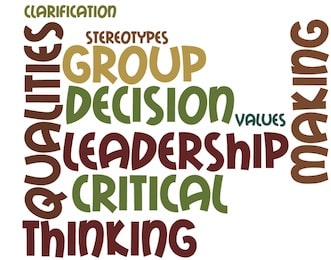Judging from the headline atop this particular blog post, you can gather that this is the fourth in a series of posts about the curriculum we offer here at The National Center for Outdoor & Adventure Education (NCOAE). And if you haven’t taken a look at the first three installments, it would behoove you to do so (see: Getting to the Core of the NCOAE Curriculum, Part 1; Getting to the Core of the NCOAE Curriculum, Part 2; and, Understanding the NCOAE Curriculum, Part 3).
 In those three posts, as well as this final chapter on the topic, we discuss the deeper social topics that are covered in our educational groups (Ed Groups), which are a key component to the delivery of our one-of-a-kind curriculum.
In those three posts, as well as this final chapter on the topic, we discuss the deeper social topics that are covered in our educational groups (Ed Groups), which are a key component to the delivery of our one-of-a-kind curriculum.
As background, it’s important to note that the objective of our curriculum is to assist in the development of skills that will help our course participants’ to become even better citizens of the world. That’s a lofty objective, but in our mind, it hovers way above what we can teach about map & compass reading and basic camp craft (which of course we do teach, as well). Because without these particular “people skills,” interacting with others in any environment — outdoor adventures included — can become an unrewarding and unruly undertaking.
In past blog posts on this topic — and again, please read those before continuing forward on this last installment — we discussed such acquirable skills as conflict resolution, civic responsibility, feelings identification and defense mechanisms, to name a few. In this, our fourth and final curriculum series entry, topics include group decision-making, values clarification, stereotypes, critical thinking, and leadership qualities.
Let’s get the ball rolling with our seventh Ed Group topic — group decision making.
Making decisions at the group level can be hampered by not taking the time to see if the proposed solution works “real time.” The group decision-making Ed Group encourages the holding of a brainstorming session, where it might be necessary for the group to identify one solution, implement that solution, then assess the plan and, if necessary, adopt a new plan.
In the values clarification Ed Group, NCOAE course participants define the values they hold most dearly, such as integrity, honesty, dependability, loyalty, open-mindedness, loving, security, etc. We ask the group to brainstorm (aha! That word again!) and come up with 50 such values, narrowing the list down to eight, and then the four most important to the group. Participants are then asked to let their own values guide what they do inside the backcountry environment — as well as when they reenter the ‘real’ world.
In the next Ed Group, NCOAE instructors focus on the topic of stereotypes, an action word that can lead to false assumptions and conclusions, frustrations, hurt feelings and even violence. Again, students “brainstorm,” creating a list of 50 common stereotypes, ranging from “he has long hair so he must do drugs,” to “white people are racist.” Participants are handed a card and instructed to debunk the listed stereotype in a competition with other course participants. As a result, rational thinking and developing skills as a well-spoken force for change are developed.
The tools required for critical thinking — the 10th Ed Group topic — include a suspension of prior judgment and being able to pinpoint and minimize particular biases. If brainstorming is widening your scope to see more, then critical thinking takes it to the next step — evaluating information and then evaluating your thoughts on that information.
Our final Ed group curriculum topic covers leadership qualities, and by that we don’t endorse the concept of leadership as “telling other people what to do.” Here, we ask course participants to see themselves as leaders and have them list leadership qualities in general, as well as leadership qualities that each individual participant sees in himself or herself. The term “born leader” is not an accurate description of a trait that can often be practiced successfully and acquired.
So there you have it, the end of our four-part series on the NCOAE Curriculum. We hope this was helpful, and if you have any questions, please feel free to leave a comment for us below.
TALK TO US
Have any further questions about our courses, what you’ll learn, or what else to expect? Contact us, we’re here to help!
Leave a comment